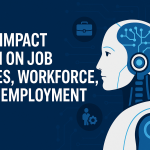Introduction
Artificial Intelligence (AI) is no longer a concept confined to science fiction. It is an integral part of our lives, powering technologies that simplify daily tasks and drive innovation in diverse industries. From healthcare to entertainment, AI has revolutionized the way we interact with technology and the world around us. In this comprehensive article, we will delve into what AI is, how it works, its applications, and the impact it is having on society today.
technology and the world around us. In this comprehensive article, we will delve into what AI is, how it works, its applications, and the impact it is having on society today.
What is Artificial Intelligence?
Artificial Intelligence refers to the capability of machines to mimic human intelligence processes such as learning, problem-solving, decision-making, and understanding language. AI systems are designed to analyze data, recognize patterns, and make decisions with minimal human input. This broad field encompasses several specialized areas, including:
- Machine Learning (ML): Allows systems to learn and improve from data over time without explicit programming.
- Natural Language Processing (NLP): Enables machines to understand, interpret, and respond to human language.
- Computer Vision: Helps machines interpret and process visual information from the world.
- Robotics: Integrates AI into physical systems to perform tasks autonomously.
AI technologies are built using algorithms, data processing models, and computational power, creating intelligent systems that can adapt and improve continuously.
How Does AI Work?
AI systems operate on large volumes of data. These systems process data through machine learning models, which use algorithms to extract insights, identify patterns, and draw conclusions. For instance:
- Supervised Learning: Machines are trained with labeled datasets, enabling them to make accurate predictions or classifications.
- Unsupervised Learning: Systems analyze data without labels to identify hidden patterns or groupings.
- Reinforcement Learning: AI learns through trial and error, optimizing actions based on rewards.
These methods enable AI systems to “learn” and make decisions autonomously, which is the cornerstone of AI’s transformative potential.
Applications of AI
AI is a versatile tool with applications across various sectors. Here’s how it’s being utilized:
1. Healthcare
AI is reshaping healthcare by enabling early diagnoses and personalized treatments.
- Medical Imaging: AI-powered tools can analyze X-rays, MRIs, and CT scans to detect diseases like cancer or neurological disorders.
- Virtual Health Assistants: These assistants provide 24/7 support to patients, answering queries and monitoring health conditions.
- Drug Discovery: AI accelerates the process of discovering and developing new drugs.
2. Finance
The financial sector uses AI to enhance efficiency and security.
- Fraud Detection: AI systems monitor transactions in real-time, identifying unusual patterns that may indicate fraud.
- Robo-Advisors: These provide automated financial advice based on user profiles and market trends.
- Algorithmic Trading: AI-driven algorithms make stock trading decisions faster and more accurately than humans.
3. E-commerce
AI has transformed online shopping experiences through:
- Personalized Recommendations: Analyzing user behavior to suggest products.
- Chatbots: Providing instant customer support and assistance.
- Inventory Management: Predicting demand and optimizing stock levels.
4. Transportation
AI is driving innovations in transportation through:
- Self-Driving Cars: Automating vehicle operations to improve road safety.
- Route Optimization: Apps like Google Maps leverage AI for real-time traffic updates and navigation.
- Fleet Management: Monitoring and optimizing logistics operations.
5. Education
AI is personalizing learning experiences for students by:
- Intelligent Tutoring Systems: Offering tailored support based on individual progress.
- Automated Grading: Saving educators time by assessing assignments and exams.
- Content Creation: AI generates study materials like quizzes and notes.
6. Entertainment
From creating music to recommending movies, AI plays a pivotal role in entertainment.
- Streaming Platforms: Netflix and Spotify use AI to recommend content based on user preferences.
- Video Games: AI powers NPC (non-playable character) behavior and adaptive storytelling.
Benefits of AI
AI offers numerous advantages:
- Efficiency: Automates repetitive tasks, freeing up time for creative and strategic activities.
- Accuracy: Reduces errors in tasks like diagnostics or data analysis.
- Scalability: Handles large-scale operations, such as managing customer interactions in global businesses.
- Innovation: Drives breakthroughs in fields like renewable energy and space exploration.
Challenges and Ethical Considerations
While AI’s benefits are immense, it also poses challenges:
- Privacy Concerns: Many AI systems rely on personal data, raising issues about security and misuse.
- Bias in Algorithms: AI can reflect the biases present in its training data, leading to discriminatory outcomes.
- Job Displacement: Automation threatens traditional job roles, requiring a shift towards reskilling the workforce.
- Accountability: Determining who is responsible for AI-driven decisions remains a complex issue.
Ensuring AI is developed ethically, with robust guidelines and accountability, is essential to addressing these concerns.
Everyday Applications of AI
AI isn’t confined to industries; it impacts our daily lives too:
- Smart Assistants: Devices like Alexa, Siri, and Google Assistant streamline everyday tasks.
- Fitness Trackers: AI-powered wearables monitor health metrics and encourage fitness goals.
- Smart Homes: AI manages lighting, temperature, and security systems for convenience and energy savings.
The Future of AI
The future of AI is brimming with possibilities:
- Advanced Robotics: Robots capable of performing complex surgeries or assisting in disaster recovery.
- Green Technology: AI optimizing energy consumption and reducing waste for a sustainable future.
- Enhanced Creativity: AI as a partner in creating art, music, and literature.
As AI evolves, its integration into daily life will become even more seamless, creating smarter, safer, and more efficient systems.
Conclusion
Artificial Intelligence is redefining what machines can achieve, pushing the boundaries of innovation and human progress. While it offers immense benefits, addressing its ethical challenges is vital for responsible implementation. As we move forward, embracing AI’s potential with a balanced approach will unlock a future filled with unprecedented opportunities. Whether it’s enhancing industries or simplifying everyday tasks, AI stands as a testament to the power of technology in transforming our world.











2 thoughts on “Artificial Intelligence: Transforming the Present and Shaping the Future”